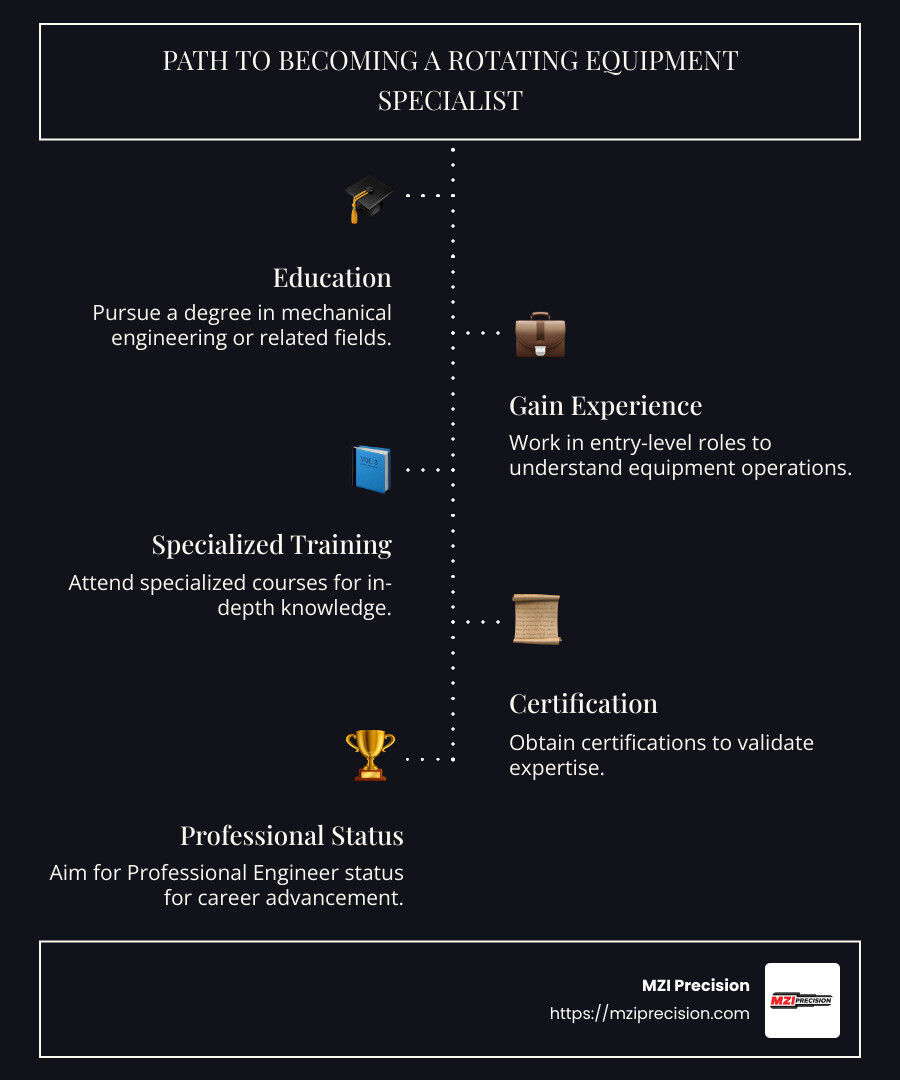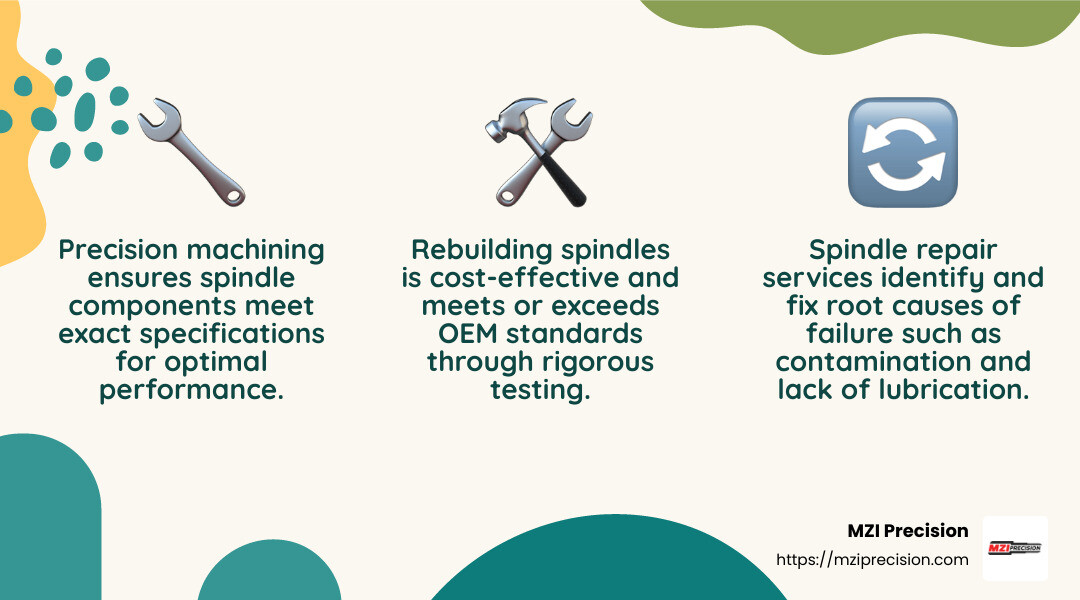Mastering Motion: The Significance of Rotating Equipment Specialists
Rotating equipment specialists play a vital role in keeping industrial machinery running smoothly. These experts focus on machines that use rotational motion—like industrial spindles—essential for a range of manufacturing processes.
- What They Do: Analyze, maintain, and repair rotating machinery.
- Industries Served: Oil and gas, chemical, and industrial manufacturing.
- Primary Goal: Ensure machines operate efficiently and safely to reduce downtime.
In industries like aerospace, where precision and reliability are crucial, having well-maintained spindles is vital for maintaining quality and productivity. This makes the role of these specialists incredibly important. Their work helps extend equipment life and improve factory efficiency, making a significant impact on production quality and cost-efficiency.

Understanding Rotating Equipment Specialists
Rotating equipment specialists are the unsung heroes in industrial manufacturing. Their expertise ensures that machines like industrial spindles, which are crucial for precision tasks, operate at peak performance.
Technical Guidance
These specialists provide technical guidance to maintain the integrity of rotating machinery. They use their deep understanding of machine dynamics to advise on the best practices for operation and maintenance. This includes selecting the right lubrication, understanding load capacities, and recommending upgrades when needed.
For example, a specialist might recommend upgrading spindle bearings to improve durability and efficiency. This guidance can save companies from costly repairs and downtime.
Maintenance Activities
Regular maintenance is key to preventing machinery breakdowns. Rotating equipment specialists conduct routine inspections and perform tasks like vibration analysis and precision balancing. These activities help catch small issues before they turn into big problems.
Consider a scenario where a specialist detects an unusual vibration pattern in a spindle. Early detection allows them to address the issue, preventing a potential shutdown and saving the company significant time and money.
Fault Diagnosis
When machines malfunction, fault diagnosis becomes critical. Specialists use advanced tools and techniques to identify the root cause of issues. They might employ laser alignment tools to ensure components are perfectly aligned or use precision instruments to measure wear and tear.
A real-world case study involved a manufacturing plant experiencing frequent spindle failures. By conducting a thorough diagnosis, the specialists finded misalignment as the culprit. Once corrected, the plant saw a dramatic reduction in downtime and maintenance costs.
In summary, rotating equipment specialists are essential for providing technical guidance, performing maintenance activities, and diagnosing faults. Their expertise ensures that industrial spindles and other rotating machinery operate efficiently, minimizing downtime and maximizing productivity.
Key Responsibilities of Rotating Equipment Specialists
Operation Integrity
Rotating equipment specialists play a crucial role in maintaining the integrity of industrial machinery. They ensure that machines, like spindles, function smoothly and without interruption. This involves constant monitoring and precise adjustments to keep everything running optimally.
For example, specialists might use vibration analysis to detect any abnormalities in a spindle’s operation. By identifying these issues early, they prevent larger problems down the road. This proactive approach helps maintain the reliability and safety of the equipment.
Maintenance Optimization
Optimizing maintenance is another key responsibility for these specialists. They focus on creating maintenance schedules that are both effective and efficient. This often involves predictive maintenance strategies, which use data and analytics to forecast when a machine will need attention, rather than relying solely on a fixed schedule.
By employing these strategies, specialists can reduce unnecessary maintenance activities and focus resources where they are most needed. This not only saves time and money but also extends the life of the equipment.
Downtime Limitation
Limiting downtime is critical in industrial settings, where every minute of inactivity can translate to significant financial loss. Rotating equipment specialists are tasked with minimizing these interruptions by ensuring that machinery is always in top condition.
Through regular inspections and timely repairs, they address potential issues before they lead to machine failures. For instance, in a case study involving a manufacturing plant, specialists were able to reduce downtime from 14 hours to 4 by implementing a condition-based maintenance approach. This involved using real-time data to predict and prevent failures, keeping the plant’s operations running smoothly.
The responsibilities of rotating equipment specialists revolve around maintaining operation integrity, optimizing maintenance processes, and limiting downtime. Their expertise is vital in ensuring that industrial machinery operates efficiently and reliably, supporting continuous productivity.
Becoming a Rotating Equipment Specialist
Education Requirements
To become a rotating equipment specialist, you typically need a strong educational background in engineering, particularly mechanical engineering. A bachelor’s degree is often the minimum requirement. Courses in machine dynamics, fluid mechanics, and materials science provide a solid foundation.
Some specialists start with an associate degree in mechanical technology or a related field, gaining practical experience as they work. However, a bachelor’s degree offers more comprehensive knowledge and better career prospects.
Career Path
After completing formal education, aspiring specialists often begin their careers in entry-level positions, such as maintenance technicians or junior engineers. This hands-on experience is crucial for understanding the nuances of rotating equipment like industrial manufacturing spindles.
As they gain experience, they can move into more specialized roles. Many professionals choose to work in industries like oil and gas, manufacturing, or chemical processing, where they can hone their skills in maintaining and optimizing rotating equipment.
Professional development doesn’t stop with entry-level roles. Continuing education and certifications, such as those offered by organizations like the Society of Tribologists and Lubrication Engineers (STLE), can improve a specialist’s credentials and open doors to advanced positions.
Professional Engineer Status
Achieving the status of a professional engineer (PE) is a significant milestone for many rotating equipment specialists. This designation requires passing the Fundamentals of Engineering (FE) exam, gaining relevant work experience, and then passing the Principles and Practice of Engineering (PE) exam.
Obtaining a PE license demonstrates a high level of competence and commitment to the field. It also allows specialists to take on more responsibility, such as leading projects or overseeing the work of other engineers.
In industrial manufacturing spindles, having a PE license can be particularly valuable. It signals to employers and clients that a specialist has the expertise needed to handle complex challenges and ensure the reliability of critical machinery.
Becoming a rotating equipment specialist involves a combination of education, practical experience, and professional development. With dedication and the right credentials, specialists can build rewarding careers in industries that rely on the seamless operation of rotating equipment.
Industrial Manufacturing Spindles: Repair and Rebuilding
Industrial manufacturing spindles are the heartbeat of many production lines. They perform critical tasks like cutting, drilling, and milling with precision. But when these spindles fail, it can lead to costly downtime. That’s where rotating equipment specialists come into play.
Precision Machining
Precision machining is at the core of spindle repair and rebuilding. This process involves using advanced tools and techniques to ensure components meet exact specifications. The accuracy of machining directly affects the spindle’s performance and lifespan.
At MZI Precision, technicians use state-of-the-art computer-controlled balancing equipment to achieve perfect balance in each spindle. This ensures durability and optimal performance once the spindle is back in action.
Repair Services
Spindle repair services are vital for maintaining the efficiency of industrial equipment. The repair process typically starts with a thorough inspection to identify the root cause of failure. Common issues include contamination, misuse, or lack of lubrication.
Once the problems are identified, specialists either repair or remanufacture faulty components. This in-house capability ensures quality control and quick turnaround times.
A detailed report is generated to outline the cause of failure and any rework needed. This transparency helps clients understand the issues and the solutions provided.
Spindle Rebuilding
Rebuilding a spindle is often more cost-effective than replacing it. During the rebuilding process, all components are carefully inspected, cleaned, and repaired. New bearings and filtered lubricants are used to ensure top-notch quality.
The rebuilding process is validated through rigorous testing. Spindle speed, temperature, and vibration are checked to ensure optimal performance. This attention to detail ensures that rebuilt spindles meet or exceed OEM standards.

In conclusion, rotating equipment specialists play a crucial role in industrial manufacturing by ensuring the reliability and efficiency of spindles. Their expertise in precision machining, repair services, and spindle rebuilding helps keep production lines running smoothly.
Next, we’ll address some common questions about what it takes to become a rotating equipment specialist.
Frequently Asked Questions about Rotating Equipment Specialists
What does a rotating equipment specialist do?
A rotating equipment specialist is like a doctor for machines. They keep industrial machinery running smoothly and efficiently. Their main tasks include:
-
Technical Guidance: They provide expert advice on how to maintain and operate rotating machinery safely. This helps prevent breakdowns and extends the life of the equipment.
-
Maintenance Activities: Regular check-ups are crucial. Specialists perform routine inspections, oil changes, and vibration analysis to catch small problems before they become big ones.
-
Fault Diagnosis: When something goes wrong, they figure out the cause. Using advanced tools, they diagnose issues and recommend solutions to get the equipment back up and running.
How do I become a rotating equipment specialist?
Becoming a rotating equipment specialist requires education and experience. Here’s a simple path to follow:
-
Education Requirements: Start with a high school diploma. Then, pursue a degree in mechanical engineering or a related field. This provides the foundational knowledge needed for the job.
-
Career Path: Begin with entry-level positions, like a maintenance technician. Gain hands-on experience working with rotating machinery. Over time, you can advance to a specialist role.
-
Professional Engineer Status: Some specialists choose to become licensed professional engineers (PE). This requires passing exams and gaining experience, but it can open doors to higher-level positions.
What is a rotating equipment fitter job description?
A rotating equipment fitter is essential in the installation and upkeep of machinery. Their job includes:
-
Maintenance: They perform regular maintenance to ensure machines operate smoothly. This includes tasks like lubrication and part replacements.
-
Installation: Fitters install new equipment, ensuring that it’s set up correctly and safely. They follow detailed instructions and use specialized tools.
-
Troubleshooting: When machines malfunction, fitters use their skills to identify and fix the problems. They work quickly to minimize downtime and keep production lines moving.
In the next section, we’ll explore more about the skills and expertise required to excel as a rotating equipment specialist.
Conclusion
At MZI Precision, we pride ourselves on our deep expertise in the field of industrial manufacturing spindles. Our commitment to exceptional service sets us apart in the industry. We understand that when your spindle is down, your operations are impacted. That’s why we offer fast, efficient repair and rebuilding services to get you back up and running with minimal downtime.
Our team of specialists is dedicated to restoring your equipment to peak performance. We don’t just fix spindles; we improve them, often making them better than new. This level of service is backed by our extensive knowledge of OEM specifications and our meticulous approach to every repair.
We also offer a full one-year in-service warranty on all units tested and repaired by our team. This ensures you can trust in the quality and reliability of our work. Our dedication to quality and customer satisfaction makes us the ideal partner for your precision spindle needs.
For more information on our services, visit our Precision Spindle Service page. Find how MZI Precision can help you maintain the efficiency and productivity of your machinery.



